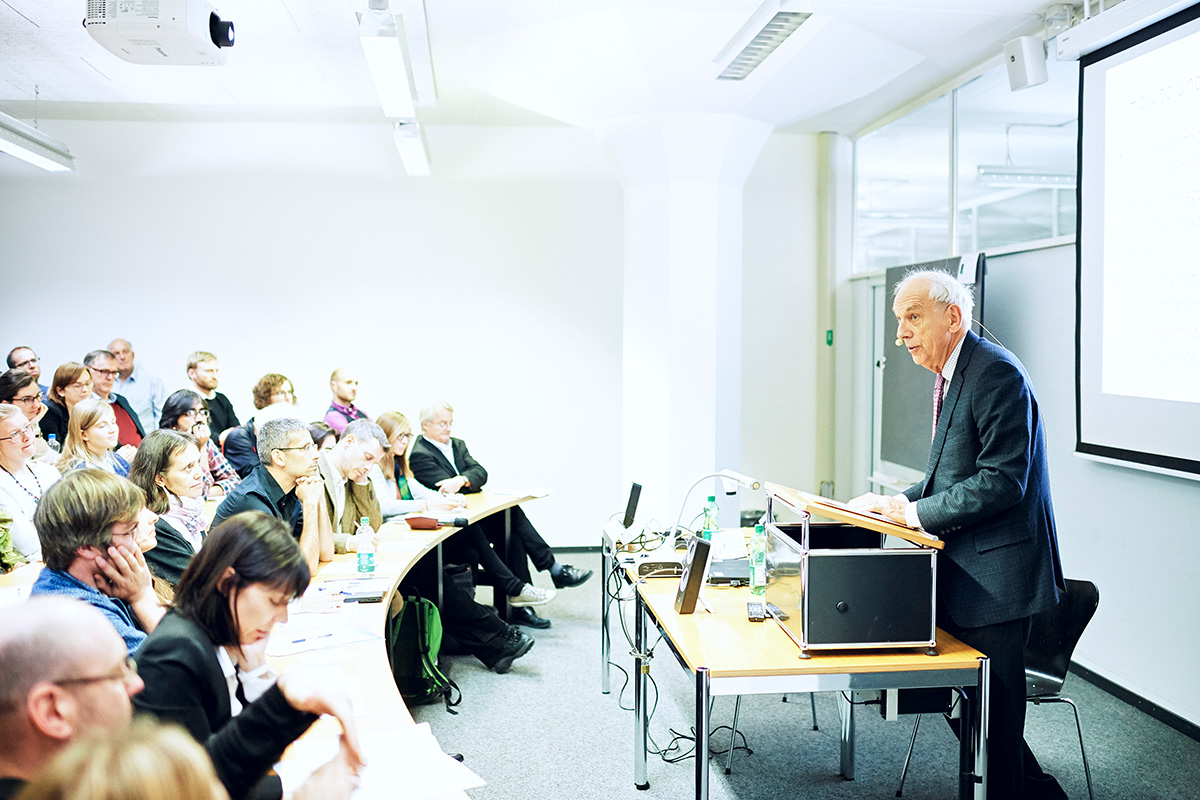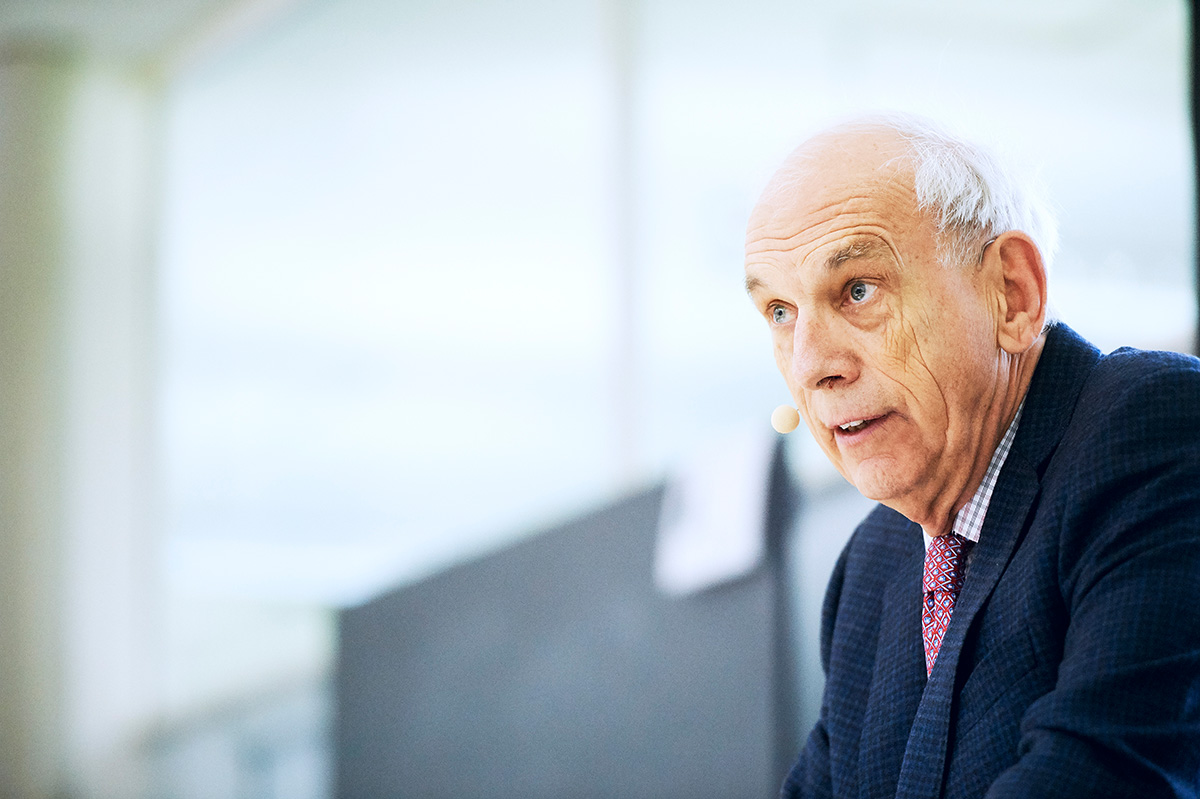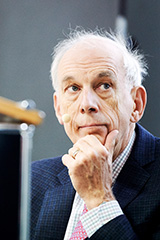Highly decorated and curious as ever
The grand old man of American political science, Robert Keohane, spoke at the Oeschger Centre for Climate Change Research at the University of Bern about the lack of success in international climate policy – also criticising the performance of his own profession in this field.
He came to Bern to collect a big grant cheque, and wanted to win over young researchers for a new international project: The political scientist Robert Keohane, 76, is Professor of International Relations at the University of Princeton and one of the very biggest names in his subject, especially in the theory of International Relations.

In 2016, after a series of distinctions, Keohane received the Balzan Prize for “International Relations, History and Theory”, which was presented to him – and other prizewinners – on 17 November in Bern. The award, with 750,000 francs in prize money, is one of the world’s most important scientific accolades. But on the day before Robert Keohane received his award in the parliament building in the presence of President of the Swiss Confederation Doris Leuthard, and was honoured with a dinner at the Hotel Bellevue, he took time for an academic exchange of thoughts. At the invitation of the Oeschger Centre for Climate Change Research at the University of Bern, he held a lecture followed by a discussion.
Climate targets even harder to achieve without USA
“Designing a global climate regime without US leadership”, was the lecture’s theme. “Even just this title makes me very angry”, said the American political scientist, right at the start. Straight away, however, he also made it clear that the American approach to climate policy has always been restrained and characterised by domestic political difficulties. “Achieving the targets of the Paris Agreement is difficult enough – without the USA this will become even harder.”

In his talk, Robert Keohane provided an outline of global climate policy so far, and compared it with the Montreal Protocol. This multilateral agreement forbidding substances that lead to the depletion of the ozone layer, and that is regarded as one of the great success stories of international environmental policy. Here he emphasised that harmony is not necessary for the creation of international agreements, because cooperation only becomes necessary when there is disagreement over a problem. The political scientist sees correctly set incentives as the key to success. “The short version of the whole story: Where the institutional incentives are correctly set, international climate protection also works.”
Poor example of the Kyoto Protocol
The somewhat more detailed explanation of the Montreal Protocol: the ban on hydrochlorofluorocarbons (HCFCs) as propellants and refrigerants could be well monitored, and created incentives to develop alternative technologies. Above all, however, not only the industrial nations were made to keep their promises, but also the developing nations. They merely had more time to dispense with ozone-depleting substances. By contrast, said Keohane, the Kyoto Protocol on climate protection had shown “how not to do it”. Main criticism: In it, the developing nations were constantly left out of climate protection measures – even China, which now produces the most greenhouse gas alongside the USA.
The specialist in international relations regards it as strategically correct for all states to have to commit to reduction measures in the Paris Agreement. “It was clever to first get all the states on board and only then, after that, to work on making the agreement more binding and effective.” The climate conference in Bonn, however, shows how difficult this second step is – it was still in full swing while Robert Keohane was a guest in Bern.
How does good climate policy come about?
After his rapid overview of climate policy, the Balzan prizewinner turned to a point that is particularly dear to his heart. At the request of the Balzan Foundation, half of the prize money is to be used to foster young scientists, so in the second half of his appearance Robert Keohane put forward an appropriate research project for discussion. He said he was not satisfied with what his discipline had contributed so far to the fight against climate change. Keohane now wants to help remedy this with a comprehensive project in comparative political science, because there was simply a lack of knowledge about how climate policies come about. “Although we have a good understanding of how, for example, industrial policy and social protection are approached in different ways, we have no idea why certain states pursue effective climate policies and others do not.” It was also important to know why cities, regions, and companies had made ambitious decisions regarding CO2-reduction.

Robert Keohane said that he wanted as many young researchers as possible to tackle these questions, addressing the fully occupied rows of the auditorium in the Unitobler Building. After all, those committing themselves to work in the still untilled field of climate policy could count on a double reward: “Grants for you and a better climate policy for all of us.”
ABOUT THE PERSON

The US-American political scientist Robert Owen Keohane (* 3 October 1941 in Chicago, Illinois) is Professor of International Affairs at the Woodrow Wilson Faculty of Princeton University. Keohane is regarded as one of the most important proponents of contemporary theory of international relations. In 2016, he was awarded the Balzan Prize.
THE OESCHGER CENTRE FOR CLIMATE CHANGE RESEARCH (OCCR)
The Oeschger Centre is the University of Bern’s centre of excellence for climate research. It was founded in summer 2007 and bears the name of Hans Oeschger (1927-1998), a pioneer of modern climate research, who was active in Bern. The Oeschger Centre brings together researchers from nine institutes and four faculties and is at the forefront of research both within and across disciplines. Only cooperation between the natural, human, social, and economic sciences, and law can discover ways to counteract global climate change on an extremely wide variety of levels: regionally anchored and globally networked.
ABOUT THE AUTHOR
Kaspar Meuli is a journalist and PR advisor. He is responsible for the communication of the Oeschger Centre for Climate Change Research.